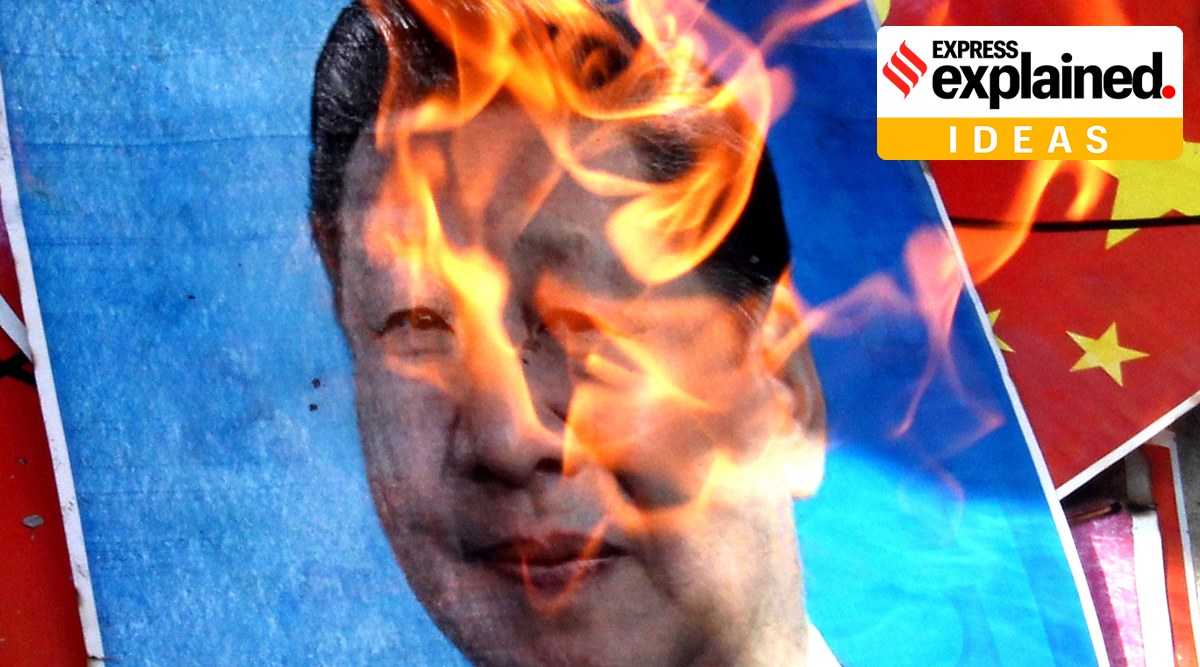
Updated: August 29, 2020 9:23:45 am
 A poster of Chinese Prime Minister Xi Jinping burns down in Ahmedabad in June 2020 (Express photo: Javed Raja).
A poster of Chinese Prime Minister Xi Jinping burns down in Ahmedabad in June 2020 (Express photo: Javed Raja).
After the loss of lives of Indian soldiers in Galwan, there have been calls for a boycott of Chinese products. To the contrary views have been expressed that the Indian economy is so dependent on China that the costs of taking action to stop imports would be disproportionately higher for India, as most manufacturing in India relies on global supply chains where China has a leadership role.
“But this is a fatalistic view,” write Meera Shankar and Ajay Shankar, both retired bureaucrats from IFS and IAS respectively. “Our dependence can be substantially reduced if there is a national will and it is decided to do so”, they affirm in their op-ed in The Indian Express.
“The size of the Indian market and its potential in the coming years provides India with considerable leverage; a leverage that we should be willing to use fully. But to use this leverage, Indians, individual consumers and businesses, have to accept that there will be a period of adjustment in which they would have to pay higher prices, ”they write.
The bottom line that should be clear to China has to be that without a mutually satisfactory border agreement and a permanent end to these border incidents, it cannot continue to function as usual and the Indian market would start to shrink for them.
The Chinese have a competitive advantage and are an integral part of global supply chains. But everything they sell is and can be made in other parts of the world. In fact, most of what we imported from China was, is, and can be manufactured in India itself. With volumes and economies of scale, the cost of production in India would decrease as it did in China.
📣 Express explained is now in Telegram. Click here to join our channel (@ieexplained) and stay up to date with the latest
“The initial focus should be on items that are still made in India and where imports from China have increased,” they say. If the RBI were to undo the appreciation of the real exchange rate, it would amount to an increase in import duties of around 10 percent.
Furthermore, the selective imposition of China’s specific safeguard duties and the use of non-tariff trade barriers should be sufficient in segments such as home appliances to allow Indian producers to expand production and increase market share.
“The government should also facilitate the flow of finance for expansion and provide technical support for testing, improving quality and reducing production costs,” they write.
Read also | Why India’s Service Sector Needs Urgent Government Attention
The authors, who were the Indian ambassador to the United States and the secretary of the Department of Industrial Policy and Promotion, respectively, go on to detail how Chinese dependence in each sector can be countered.
“We should note India’s strong determination and willingness to bear the cost. China could choose to settle the border amicably and have full access to our market. ” they conclude.
📣 The Indian Express is now on Telegram. Click here to join our channel (@indianexpress) and stay up to date with the latest headlines
For the latest news explained, download the Indian Express app.
© The Indian Express (P) Ltd
.